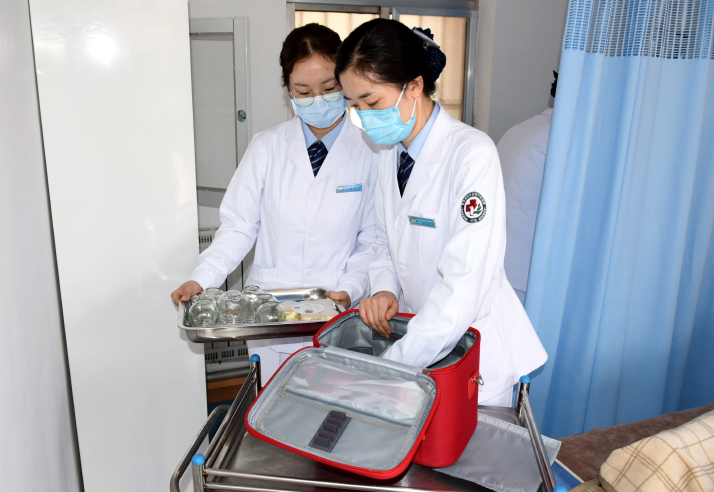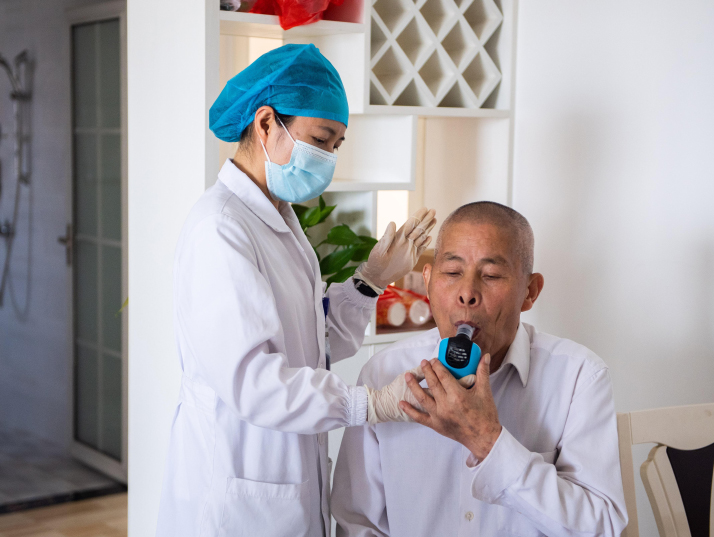| China |
| Bringing healthcare closer | |
|
|
 Nurses from a hospital in Qingdao, Shandong Province, prepare the medical equipment needed for home nursing services on May 10, 2023 (XINHUA)
Increasing accessibility, better catering to the needs of seniors and offering more personalized forms of care have all been major trends in the development of China's healthcare industry in recent years. To achieve these goals, major apps and online platforms, as well as individual hospitals, have been using technology to increase the availability and efficiency of in-home nursing care. As a result of their efforts, calling a nurse to your doorstep is now as easy as ordering food delivery. One of these nurses is Liu Qinglan, who works at the Sichuan Provincial Maternity and Child Health Care Hospital (MCHCH) in Chengdu, Sichuan Province. One November morning in 2024, Liu was enjoying her day off and after dropping her child off at kindergarten, a notification popped up in her Weixin (China's dominant multi-purpose messaging app, the international version of which is known as WeChat) group: A postpartum woman needed at-home wound care. As Liu lived close to the woman, she accepted the order and was granted access to the patient's medical records on her phone. Quickly changing into her uniform, grabbing her nursing kit and hopping in her car, she drove to the patient's home. "Our Weixin group connects nearly 100 experienced nurses, each with over five years of expertise," Liu explained to news portal Chengdu.cn. "We're located across Chengdu's main urban area and accept nearby assignments during our off-duty hours." After confirming identities, Liu made her examination and applied fresh dressings. She also conducted a thorough assessment of the mother's diet, sleep and emotional wellbeing, as well as the baby's development. Unlike the hospital environment, where she has the support of a team, at-home nursing requires her to work independently, for which she has received specialized training. Convenience for patients The rise of "Internet Plus home nursing" services is transforming healthcare access across China, offering patients unprecedented convenience. Numerous hospitals have embraced this model, enabling nurses to provide vital care directly in people's homes. Consider the case of Lian Ping, a nurse at Jinan Third People's Hospital in Jinan, Shandong Province. Late last December, Lian visited the home of an 80-year-old resident surnamed Cui to change her urinary catheter and take a blood sample. Cui, paralyzed by a cerebrovascular disease, required a monthly catheter change—a task that previously meant a great ordeal. "In the past, getting my mother to the hospital for this procedure involved a cumbersome effort of carrying her downstairs, registering and then waiting, often consuming half a day," Cui's daughter explained to Haibao News, a news portal in Shandong. "It was a difficult experience for my mother and a source of stress for us. Now, with just a few taps on our phones, a nurse comes to our home—it's incredibly convenient." This is Lian's 13th year as a nurse and her fourth year providing these critical on-demand services. Over the past four years, Lian has completed nearly 3,000 home visits beyond her regular work duties, sometimes handling as many as 10 appointments in a single day. "I feel a profound sense of purpose and value," Lian said. "So many people and families need our help. It makes me realize how truly amazing our profession is." In addition to standard nursing tasks, these nurses also provide crucial support with medical equipment. Wang Tao from Shandong Public Health Clinical Center in Jinan told Haibao News that since registering as an online nurse on e-commerce giant JD.com's app, he has since assisted many patients and their families with the adjustment of home-use non-invasive ventilators. "Often, people who purchase these machines for conditions like snoring don't know how to set the specific parameters correctly," said Wang. "In addition to ventilators, we also receive requests for help with adjusting other devices such as glucometers and oxygenerators." These at-home tasks typically earn nurses between 80 and 120 yuan ($11-16) per visit.  A nurse tests a patient's lung function at the patient's home in Changsha, Hunan Province, on May 8, 2021 (XINHUA)
Preventing risks While "Internet Plus nursing services" offer considerable benefits—saving medical resources for hospitals, providing convenience for patients and offering financial opportunities for nurses—the model also presents several inherent risks, particularly concerning nurse safety and potential medical disputes. A primary concern is the personal safety of nurses, many of whom are women and often work alone in unfamiliar environments. "The first time I went on a home visit back in 2020, I was quite anxious and brought my husband along," Lian recalls. Fortunately, online platforms are implementing measures to mitigate these risks. Lian explains that her platform offers GPS tracking, which activates immediately upon accepting an order. Real-time audio recording and a one-click alarm function are also standard features, providing added security. Moreover, many platforms also purchase insurance for their nurses, including personal accident policies. The question of ensuring safe operations during these home visits is also a key focus. To ensure patient safety and quality care, hospitals prioritize selecting experienced nurses. He Xiaochun, head of nursing at the Sichuan Provincial MCHCH, explained to Chengdu.cn that nurses must complete specialized training before providing in-home services. Furthermore, patients have been evaluated to see if home-based care is suitable. "We generally serve patients who have already been treated at our hospital, so we can assess their suitability for at-home care based on their existing medical records," said Xie Linjun, head of nursing at Sichuan Tianfu New Area People's Hospital in Chengdu. He Xiaochun added that new patients are required to fill out a detailed medical form before receiving a home visit, which nurses then review to ensure they meet the criteria for home-based care. Many public hospitals are actively working to expand the reach of home nursing. He Xiaochun expressed hope for the creation of a unified platform for maternal and child health care in Sichuan, which will allow more grassroots-level medical institutions to carry out home nursing services. The Health Commission of Sichuan Province is also supporting major hospitals in utilizing advanced technologies, such as big data, cloud computing and artificial intelligence, to further improve the efficiency and safety of their home nursing operations. BR Copyedited by G.P. Wilson Comments to jijing@cicgamericas.com |
|
||||||||||||||||||||||||||||||
|